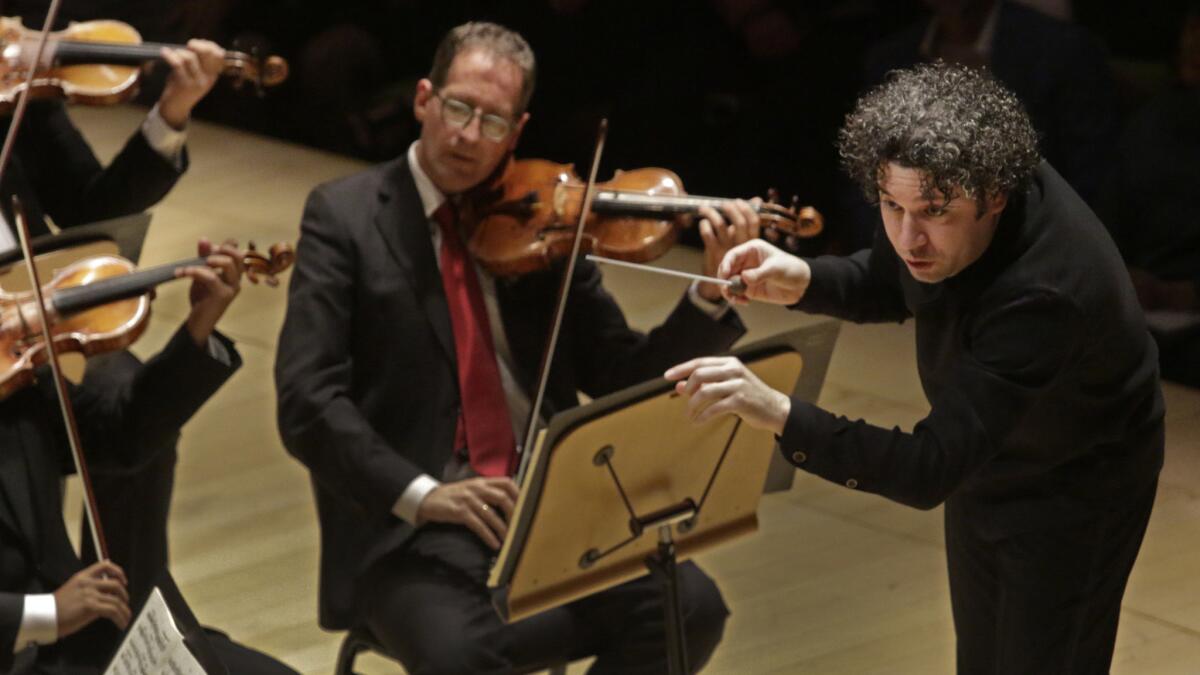Review: The orchestral worlds of Los Angeles and Venezuela collide for Beethoven’s Ninth at Disney Concert Hall

Gustavo Dudamel conducting the LA Phil, the Simón Bolívar Symphony and Los Angeles Master Chorale in Beethoven’s 9th Symphony at Walt Disney Concert Hall in on Oct. 4, 2015.
- Share via
With the culmination of his Beethoven symphony cycle at Walt Disney Concert Hall on Sunday afternoon, Gustavo Dudamel reached the imposing climax of a tour through Beethoven’s artistic and psychic development that nearly every conductor of note has taken. The brilliantly imposing performance on this occasion featured the combined Los Angeles Philharmonic and Simón Bolívar Symphony Orchestra of Venezuela, along with the Los Angeles Master Chorale and four soaring young vocal soloists, all in marvelous form.
But it wasn’t exactly a climax.
If your gauge is an excitement meter, that peaked the night before with Bolívars’ hair-raising Seventh and Eighth symphonies. If social good is the goal, nothing can top the way Dudamel began his music directorship of the Los Angeles Philharmonic six years ago with a free Hollywood Bowl performance of the Ninth Symphony for the community.
SIGN UP for the free Essential Arts & Culture newsletter >>
That Bowl performance may not have been so fully fleshed out as it was Sunday. But the momentous and moving occasion signaled Dudamel’s promise for community outreach by the L.A. Phil, especially in education. And the fruits of this commitment now surround the symphony performances, which are part of the orchestra’s “Immortal Beethoven” festival. The other parts are neighborhood concerts with the Bolívars, a national music education symposium and the cool virtual-reality Disney-Hall-on-wheels called Van Beethoven.
In fact, Dudamel’s challenge was to make Sunday’s Ninth, which will be repeated Tuesday and Wednesday nights and at the end of the second cycle next weekend, not anticlimactic. He had already conducted the Finale, the inescapable “Ode to Joy,” with the same forces at the L.A. Phil’s opening-night gala earlier in the week. On Friday, Dudamel released a fervent new recording of the symphony with the Bolívars and an ardent Venezuelan youth chorus.
Through its 75-minute course, the Ninth traces an inevitable path from gloom to glory, from nothingness to meaning, from despondency to exultation. As at the Bowl, the new recording made in Caracas in April is a Ninth meant to stand for hope, in this case as a plea for brotherhood in a country that is divided and in crisis.
The brotherhood business was again the motivation Sunday. The symphony cycle during the last three days had proved inconsistent, so different are the characters of the two orchestras. The Bolívars’ youth and electricity are such a jolt to a listener’s nervous system that it overwhelms the L.A. Phil’s greater refinement. When the two orchestras came together at the gala, the best of both worlds was achieved through satisfying compromise.
The full Ninth, though, felt like something new. Here the L.A. Phil came much more to life than it had all week, with or without the Bolívars. The Venezuelans, on the other hand, did not appear restrained at all, just less macho and more thoughtful. The U.S. and Venezuela may not have good relations these days, but our State Department could witness advanced diplomacy in action at Disney Hall.
Dudamel’s performance did not downplay the obvious high points of the symphony that get an audience every time. But he placed them in far richer context than he had in the past, especially on his attention on the wonders of color and detail. Propulsion comes, of course, naturally to him, and having more players at his disposal only encourages him to apply more momentum. It’s more thrilling to defy gravity than let it control you.
Nonetheless, this Ninth was, in other ways, grounded, more realpolitik than idealist and decidedly not mystical. Dudamel maintained a classical restraint in the first movement. He let the spiritual awe of the opening speak for itself through a halo of ethereal string sound.
He brought a vigorous enthusiasm to the Scherzo. In the slow movement, which was luxuriously slow, he placed higher value on sunlight than clouds.
The Finale, for Dudamel, is more adventure than drama, nothing damping down his eagerness for optimism. Bass Soloman Howard helped set the tone with a boomingly inviting call to friendship. The other soloists — soprano Mariana Ortiz, mezzo-soprano J’nai Bridges and tenor Joshua Guerrero (all are on the recording as well) — made a tight, strong ensemble. The Master Chorale sang with a Dudamelian spirit it has mastered over the years. Meanwhile, the blending of two completely different styles of symphonic playing created a frisson of refreshing orchestra textures.
Six years ago, Dudamel was less restrained, glorying in every little bit of the big Finale and then needing to outdo himself at the end. Now he takes a longer view. Gratification isn’t instant but lasting. What stays with me from the Hollywood Bowl was the atmosphere. At Disney, Dudamel now offers a Ninth to remember.
::
Beethoven Symphony Cycle
Who: Los Angeles Philharmonic and Simón Bolívar Symphony Orchestra
Where: Walt Disney Concert Hall, 111 S. Grand Ave., Los Angeles
When: Through Sunday
Tickets: $26.50-$213.50
Info: (323) 850-2000, www.laphil.org
More to Read
The biggest entertainment stories
Get our big stories about Hollywood, film, television, music, arts, culture and more right in your inbox as soon as they publish.
You may occasionally receive promotional content from the Los Angeles Times.











